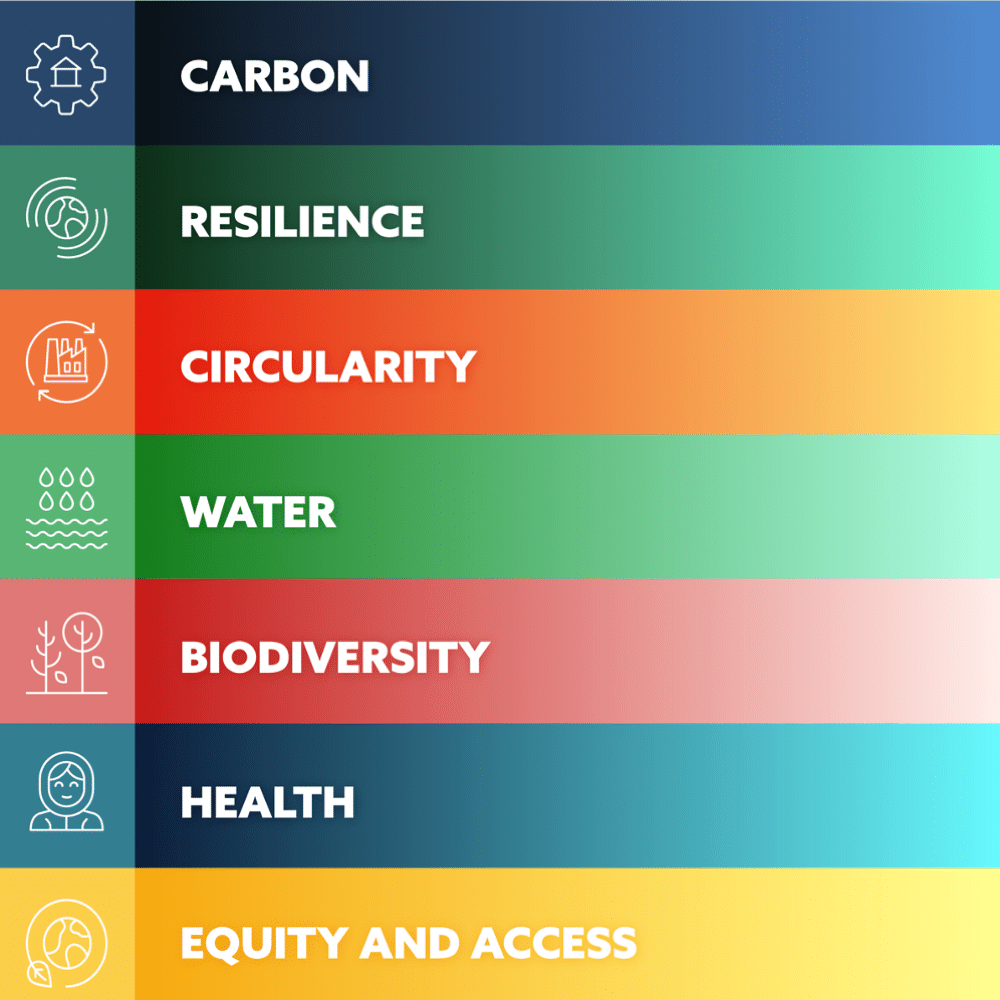New Global Policy Principles from WorldGBC
Principles outline transformative action policymakers can take to accelerate sustainability action in the built environment
WorldGBC on April 12, 2023
- Theme
- Advocacy
Ahead of the G7 Ministers’ Meeting on Climate, Energy and Environment (15–16 April 2023), the World Green Building Council (WorldGBC), and its network of 75+ Green Building Councils, launch a set of principles aimed at guiding national governments to develop effective building policies and programmes to accelerate a decarbonised future.
Sobering analysis from the latest Intergovernmental Panel on Climate Change (IPCC) report tells us there is a rapidly closing window of opportunity to implement policies that will keep us within the 1.5°C warming limit.
Many of the priority topics for the upcoming G7 ministers meeting can be addressed by buildings — from achieving both energy security and net zero, to advancing the transition to circular economies. Worldwide, buildings are responsible for 37% of energy related carbon emissions and 34% of energy demand (Source GlobalABC Status Report 2022). With such a significant environmental and carbon impact, leaders and policymakers must recognise the built environment as a key agent of change to close the 1.5°C gap.
WorldGBC and its network have launched the “Global Policy Principles for a Sustainable Built Environment”, to support policymakers around the world adopt a holistic approach to built environment sustainability, and ensure that new and updated policies and legislations deliver the transformative action needed to reach the Paris Agreement and Sustainable Development Goals.
The principles are structured around seven key focus areas: carbon, resilience, circularity, water, biodiversity, health, equity and access. These areas are supported by detailed policy levers to show how they can be effectively implemented through regulation, information and incentives.
We know from the most recent IPCC report that current government policies will see warming exceed 1.5°C during the 21st century – causing irreversible harm to the environment and our most vulnerable members of society.
Despite being the largest contributing sector to carbon emissions, the building and construction industry is still not on track to achieve total decarbonisation by 2050 (Source GlobalABC Status Report 2022); meaning the gap between actual climate performance of the sector and its pathway to decarbonisation is widening.
This creates a dual challenge for the built environment — with markets in Asia and Africa expecting their building stock to double by mid-century. Meanwhile other regions are grappling with the challenges of renovating energy inefficient buildings.
Our sector is in a strong position to deliver resilient development that integrates mitigation and adaptation measures, whilst also addressing other pressing societal issues, including energy security, resilience, health and equity.
In this Global Stocktake of the Paris Agreement year, and ahead of countries submitting updated Nationally Determined Contributions (NDCs) in 2024, it is crucial that political leaders take bold actions to strengthen and implement building policies that deliver transformative change.”
Cristina Gamboa, CEO, WorldGBC

By supporting the delivery of these principles, governments will be sending a clear signal to the market that decarbonised built environments are a priority, therefore enabling industry to deliver more innovative solutions. But governments must take a holistic approach, embracing public funding and influencing financial investment decisions and tools that consider carbon mitigation, resilience and green buildings.
Government policy has tremendous power to signal to the building sector and investment community its support for green building and decarbonization. WorldGBC’s Global Policy Principles provide timely guidance for all governments seeking to advance green building policies and address risks associated with “business as usual” approaches. The primary focus must be reducing carbon emissions and increasing resilience through new zero-carbon buildings and deep carbon retrofits. However, policies also need to take a broader environmental view of the benefits green buildings can deliver
Thomas Mueller, President & CEO, CAGBC
WorldGBC and its Green Building Council network invite governments to use these “Global Policy Principles for a Sustainable Built Environment’ as a tool to review and update existing legislation; as well as offering their support within a local and global context to ensure national policies deliver resilient development that integrates mitigation and adaptation measures, whilst also addressing other pressing societal issues, including: energy security, resilience, health and wellbeing.
